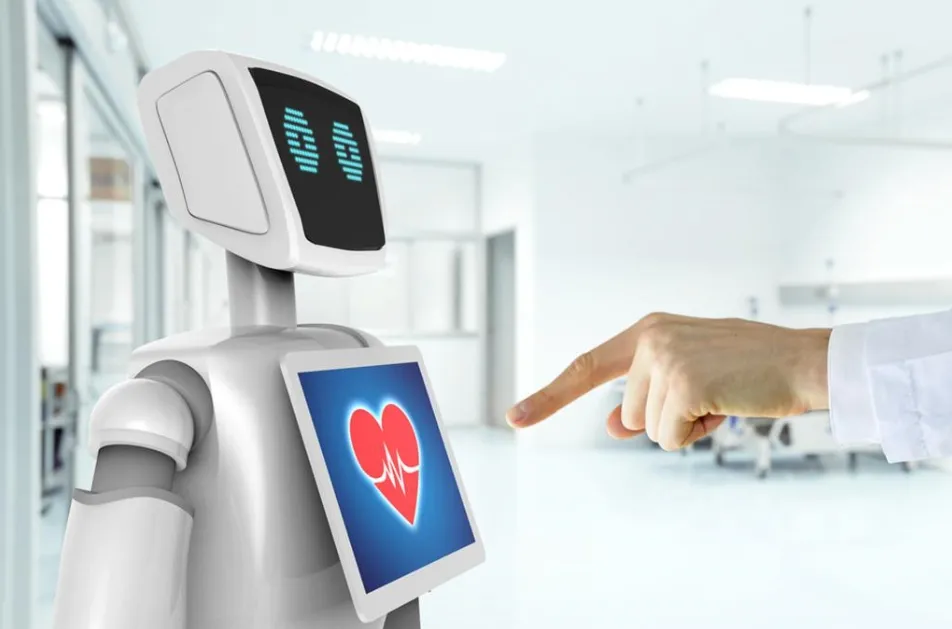How to Use Artificial Intelligence for Business Revenue Growth in Healthcare, Retail, and Transportation
Table of contents
The new era of Artificial Intelligence (AI) has already begun, transforming various industries and revolutionizing businesses worldwide. The recent emergence of ChatGPT is just one example of AI's potential impact. From healthcare to finance, manufacturing to retail, AI is reshaping the way we operate.
To stay competitive, businesses must not only consider AI but also adapt and integrate it into their operations. With the growing availability of data and advancements in computing power, AI is now more accessible to businesses of all sizes. Embracing AI is no longer a choice but a necessity, offering opportunities to reduce costs, improve efficiency, and provide personalized customer experiences. Prepare for the AI revolution and unlock the full potential of your business.
Leading market research firms like Forrester and IDC predict a rapid acceleration in AI adoption by businesses. The shared goal of both SMEs and large corporates is to scale up profits, and AI value plays a crucial role in achieving a positive impact on overall returns. Embracing AI technology is essential for businesses looking to stay competitive in today's market.
Let’s match the words with numbers. According to ABI Research report, the healthcare industry is expected to witness significant savings in 2021. The report predicts that hospitals worldwide will save a whopping $52 billion, with North America leading the way with $21 billion in savings. These optimistic projections highlight the potential for substantial cost reductions in the healthcare sector, emphasizing importance of embracing technological advancements to drive efficiency and financial benefits.
According to recent research by Statista, AI solutions have the potential to drive significant cost savings of 49% and boost productivity by 44% in the global retail industry. These findings highlight the transformative impact of AI technology in enhancing operational efficiency and financial performance for retail businesses worldwide.

Taking a look at transportation, as Allied Market Research did, we’ll see that only self-driving tech is likely to ensure a $556 billion market by 2026, increasing at a 39% CAGR from $54 billion in 2019.
These are only several samples of the industries that can experience significant economic boost by leveraging the AI potential. A strategic challenge here is to decide on the right steps to seize the power of AI, cut costs, and attain revenue growth.
Let’s go on with the industries mentioned above and discover how artificial intelligence solutions benefit businesses and lead Healthcare, Retail, and Logistics & Transportation to opening new revenue streams.
Use Cases of AI in the Retail Business
AI-Powered Transformation in Retail
The retail industry is experiencing a dynamic shift driven by e-commerce and evolving consumer preferences. Embracing Artificial Intelligence (AI) can empower retailers to unlock a plethora of benefits and enhance the overall shopping experience. By leveraging AI technology, retailers can personalize recommendations and tailor the shopping journey based on valuable data insights. Additionally, AI enables optimized inventory management by accurately predicting demand and ensuring appropriate stock levels.
Supply chain management can also be revolutionized through AI, with predictive capabilities to anticipate delivery times, streamline logistics, and reduce costs. Machine learning algorithms analyze customer purchases, receipts, and sales returns across store chains, identifying top-selling products and enabling customized offers. This data-driven approach empowers retailers to rationalize their product assortment, making informed decisions on adding or removing items to prevent stock from going unsold. Stay ahead in the retail industry by harnessing the power of AI to drive efficiency, customer satisfaction, and profitability.

Revolutionizing Retail with AI: 15 Innovative Ideas to Enhance Customer Experience and Drive Profitability
1. Personalized Recommendations: Utilize AI algorithms to analyze customer data and browsing behavior, enabling personalized product recommendations tailored to each individual's preferences and needs.
2. Inventory Management: Implement AI-powered demand forecasting models to optimize inventory levels, ensuring the right products are available at the right time, minimizing stockouts, and reducing excess inventory.
3. Pricing Optimization: Utilize AI algorithms to analyze market trends, competitor pricing, and customer demand to dynamically adjust prices for maximum profitability while remaining competitive.
4. Virtual Shopping Assistants: Integrate AI chatbots or virtual shopping assistants that can engage with customers, answer inquiries, provide product recommendations, and facilitate seamless online shopping experiences.
5. Fraud Detection: Deploy AI algorithms to detect and prevent fraudulent activities, such as credit card fraud or identity theft, safeguarding both the retailer and customers. Moreover, AI is the powerful weapon in the fight against counterfeits. AI counterfeit detector apps are able to check the authenticity of the product. The AI-empowered image recognition technology saves both money and company’s reputation.
6. Visual Search: Implement AI-powered visual search capabilities that allow customers to search for products using images, enhancing the ease and convenience of finding desired items.
7. Supply Chain Optimization: Utilize AI to optimize supply chain operations, including demand forecasting, route optimization, and warehouse management, improving efficiency and reducing costs.
8. Customer Sentiment Analysis: Utilize AI to analyze customer feedback, reviews, and social media sentiment to gain insights into customer satisfaction levels, identify areas for improvement, and enhance the overall customer experience.
9. Dynamic Pricing: Implement AI algorithms that dynamically adjust prices based on factors such as demand, competitor pricing, and inventory levels, enabling retailers to optimize revenue and maximize sales.
10. Predictive Maintenance: Utilize AI-powered predictive maintenance systems to monitor and analyze data from equipment and machinery, enabling proactive maintenance to prevent costly breakdowns and minimize downtime.
11. Chatbot Customer Support: Cut labor costs and amuse buyers with helpful bots. Implement AI chatbots to provide instant customer support, answer frequently asked questions, and assist with order tracking, enhancing customer satisfaction and reducing support costs. It’s a double strike —stores provide exceptional customer experience via including customer service bots in the retail process and minimize the expenditure on workers. Potential buyers promptly get all necessary information on the product location, characteristics, or advantages and individual recommendations thanks to 24X7 digital assistance.
12. Augmented Reality (AR) Shopping: Utilize AI-powered AR technology to enable virtual try-on experiences, allowing customers to visualize products before purchasing, enhancing the online shopping experience.
13. Customer Segmentation: Utilize AI algorithms to segment customers based on their preferences, purchase history, and behavior, enabling targeted marketing campaigns and personalized promotions.
14. Social Media Analytics: Utilize AI-powered tools to analyze social media data, identify trends, monitor brand sentiment, and gain insights into customer preferences, enabling retailers to tailor their marketing strategies accordingly.
15. Voice Commerce: Implement AI-powered voice assistants that enable customers to make purchases using voice commands, simplifying the shopping process and providing a hands-free experience.
AI Can Improve Business Growth in Logistics and Transportation
Unlocking the Power of AI in Transportation and Logistics: Revolutionizing Routes, Safety, and Efficiency
As technology advances and consumer preferences evolve, the transportation sector is experiencing a remarkable transformation. Artificial Intelligence (AI) emerges as a crucial tool in optimizing transportation routes, leading to reduced fuel consumption and cost savings.
By harnessing the potential of AI, we can also enhance safety by analyzing driver behavior and identifying potential hazards. The introduction of self-driving vehicles, heavily reliant on AI, holds the promise of revolutionizing transportation, bringing forth improved safety, reduced expenses, and heightened operational efficiency.

AI in Logistics and Transportation: 15 Cutting-Edge Ideas to Optimize Operations, Improve Customer Satisfaction, and Drive Business Growth
1. Route Optimization: Utilize AI algorithms to analyze historical traffic data, weather conditions, and real-time updates to optimize delivery routes, reducing fuel consumption, and improving overall efficiency. Apart from strategic issues, there is a scope of routine tasks that can and should be addressed to AI. That is how the industry automates back office processes, gets rid of human errors, and gains the increased performance as soon as the tandem of AI and robotic process automation save time considerably.
2. Demand Forecasting: Talking about transportation company planning, AI covers a set of algorithms that define how many goods and suppliers will be required. Correct predictions address several challenges at once — ensure personalized customer experience, proper inventory management, streamlined warehousing operations, and smooth delivery process.
3. Predictive Maintenance: Utilize AI to analyze sensor data from vehicles and equipment, enabling predictive maintenance to detect potential issues before they cause breakdowns, minimizing downtime, and reducing maintenance costs.
4. Real-time Tracking and Visibility: Implement AI-powered tracking systems that provide real-time visibility of shipments, enabling logistics providers to monitor and manage deliveries more effectively, improving customer satisfaction.
5. Autonomous Vehicles: Explore the use of AI in autonomous vehicles for transportation and last-mile delivery, reducing human errors, improving safety, and optimizing delivery times.
6. Warehouse Management: Utilize AI algorithms to optimize warehouse operations, including inventory management, picking and packing, and storage optimization, improving efficiency and reducing costs.
7. Risk Management: Deploy AI-powered risk management systems that can analyze data from various sources, such as weather conditions, traffic patterns, and historical accident data, to identify potential risks and make proactive decisions to mitigate them.
8. Freight Matching and Load Optimization: Utilize AI-powered platforms that match available freight with the most suitable carriers, optimizing load planning, reducing empty miles, and improving resource utilization.
9. Customer Service and Support: Implement AI chatbots or virtual assistants to provide instant customer support, track shipments, and handle inquiries, enhancing the overall customer experience and reducing support costs.
10. Energy Efficiency: Utilize AI algorithms to optimize energy usage in transportation and logistics operations, identifying opportunities to reduce fuel consumption, CO2 emissions, and overall environmental impact.
11. Supply Chain Analytics: Utilize AI-powered analytics tools to analyze supply chain data, identify bottlenecks, optimize inventory levels, and improve overall supply chain performance.
12. Risk Assessment and Fraud Detection: Utilize AI algorithms to assess the risk associated with different transportation routes, detect anomalies in shipping patterns, and identify potential fraudulent activities, enhancing security and reducing losses.
13. Dynamic Pricing and Capacity Management: Implement AI algorithms to dynamically adjust pricing and manage capacity based on factors such as demand, seasonality, and competitor pricing, optimizing revenue and resource allocation.
14. Collaboration and Network Optimization: Utilize AI-powered platforms that facilitate collaboration and optimization among multiple stakeholders in the transportation and logistics ecosystem, improving coordination, and reducing inefficiencies.
15. Autonomous Drones and Robots: Explore the use of AI-powered drones and robots for last-mile delivery and warehouse operations, improving speed, accuracy, and reducing labor costs.
How to use AI in Healthcare?
Trust AI when it comes to making diagnoses
It’s time to admit that AI equals or even exceeds humans in the accurate detection of medical conditions. So, why not share medical images with AI and let AI-enabled solutions scan them at a quick pace? They will provide speedy and precise conclusions and early-stage diagnoses, while medical staff will concentrate on dealing with challenging medical cases and taking care of patients.
The healthcare industry is poised for a transformative revolution with the integration of Artificial Intelligence (AI). By harnessing the power of AI, healthcare providers can unlock numerous benefits to enhance patient outcomes and streamline operations. It’s time to admit that AI equals or even exceeds humans in the accurate detection of medical conditions. So, why not share medical images with AI and let AI-enabled solutions scan them at a quick pace? With vast amounts of data generated in healthcare, AI offers the ability to analyze and identify patterns, providing valuable insights for treatment plans. AI-powered diagnostic tools empower doctors to make more precise diagnoses and create personalized treatment approaches.
Moreover, AI can optimize hospital and clinic operations by predicting patient demand, optimizing staffing levels, and efficiently allocating resources. Embracing AI in healthcare brings unprecedented opportunities to improve efficiency, accuracy, and ultimately, the overall quality of patient care. Stay ahead of the curve by leveraging the potential of AI in the healthcare industry.

15 Cutting-Edge Ideas foring Harness AI in Healthcare
1. Medical Diagnosis: AI algorithms can assist in diagnosing diseases by analyzing medical images, symptoms, and patient history.
2. Predictive Analytics: AI can predict disease progression, identify high-risk patients, and help healthcare providers make proactive decisions.
3. Personalized Treatment Plans: AI can analyze patient data and provide personalized treatment recommendations based on individual characteristics, genetics, and medical history.
4. Drug Discovery: AI algorithms can accelerate the drug discovery process by analyzing vast amounts of data, identifying potential drug candidates, and predicting their effectiveness.
5. Virtual Assistants: AI-powered virtual assistants can provide patients with personalized healthcare advice, answer queries, and offer support for managing chronic conditions.
6. Remote Monitoring: AI-enabled devices can remotely monitor patients' vital signs, detect abnormalities, and alert healthcare providers in real-time.
7. Fraud Detection: AI algorithms can analyze healthcare claims data to identify patterns of fraudulent activities, preventing financial losses.
8. Precision Medicine: AI can analyze genetic information to identify genetic markers, predict disease risks, and develop personalized treatment plans.
9. Robot-Assisted Surgery: AI-powered robots can assist surgeons in performing complex surgeries with precision, reducing human error and improving patient outcomes.
10. Health Data Analysis: AI algorithms can analyze large volumes of healthcare data to identify trends, patterns, and insights that can aid in public health planning and policy-making.
11. Chatbots for Mental Health: Customer loyalty is a prime source of generating profits. Patients can be offered 24/7 self-service, get consistent answers across multiple channels, manage their diseases, and resolve their concerns with the help of chatbots and AI-based mobile apps. AI-powered chatbots can provide mental health support, offer coping strategies, and direct individuals to appropriate resources.
12. Early Disease Detection: AI algorithms can analyze patient data and identify early signs of diseases, enabling timely intervention and improved outcomes.
13. Clinical Decision Support: In the era of Big Data, AI leverages huge data volumes to find optimal medications and treatment strategies. Overall, this capacity results in the streamlined care and saving the money related to treatment complications — right AI-driven decision making will simply avoid negative scenarios. In the meantime, AI algorithms analyze the effectiveness of drugs for the treatment of particular diseases thus investing efforts in the enhanced drug development. Moreover, AI systems can provide healthcare professionals with evidence-based recommendations and guidelines to aid in clinical decision-making.
14. Patient Monitoring and Alerts: AI can analyze patient data in real-time and send alerts to healthcare providers for timely interventions in critical situations.
15. Healthcare Resource Allocation: AI algorithms can analyze patient demand and optimize resource allocation, such as hospital beds, staff scheduling, and equipment utilization, ensuring efficient healthcare delivery.
What is the average cost for AI solutions?
The average cost of AI solutions can vary greatly depending on the specific requirements and providers. On average, companies can expect to invest anywhere from $0 to over $500,000 for an AI software solution.
When it comes to custom AI solutions, the costs can range from $6,000 to over $500,000. The final price largely depends on the complexity of the project and the resources needed for development and implementation.
For those considering third-party AI software, such as pre-built chatbots, the costs can vary from $0 to $40,000 per year. While there are free options available, they may not meet the specific needs of larger businesses.
Additionally, there are AI consulting services, which typically have lower costs compared to custom solutions. The price for consulting services depends on the consultant's hourly fee, with most AI consultants charging between $200 and $350 per hour.
Overall, the price range for AI solutions is quite broad, allowing businesses to find options that align with their budget and requirements.
Conclusion
AI's potential to drive revenue growth in healthcare, retail, and transportation is immense. The ability of artificial intelligence to analyze massive data sets helps to improve decision-making processes, create innovative products, attract customers’ attention, and generate demands thus increasing revenue. By embracing AI technologies, businesses can optimize decision-making processes, deliver personalized experiences, and gain a competitive edge in their respective industries.
Working with chatbots, machine learning algorithms, and intelligent apps, Emerline feels how powerful AI is in forming the core of a new virtual workforce able to address customers’ requests and handle their issues. We will give you a clue on how to make a real profit with AI trends.
Published on Feb 20, 2023





